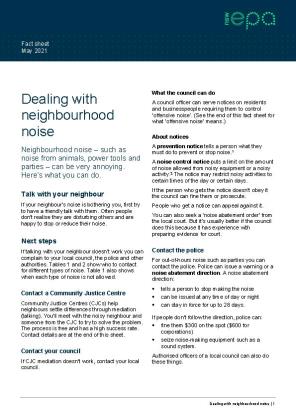When noise annoys
Noise is defined under the Protection of the Environment Operations Act (POEO Act) 1997 to include both sound and vibration.
The POEO Act 1997 dictionary defines offensive noise as:
offensive noise means noise—
(a) that, by reason of its level, nature, character or quality, or the time at which it is made, or any other circumstances
(i) is harmful to (or is likely to be harmful to) a person who is outside the premises from which it is emitted, or
(ii) interferes unreasonably with (or is likely to interfere unreasonably with) the comfort or repose of a person who is outside the premises from which it is emitted, or
(b) that is of a level, nature, character or quality prescribed by the regulations or that is made at a time, or in other circumstances, prescribed by the regulations.
More information on offensive noise can be found in the Noise Guide for Local Government.
If a source of noise is a problem for you, there are several things you can do.
Talk amicably to noisy neighbours
Often people do not realise how loud they are being and are happy to turn down or stop the noise.
Contact a Community Justice Centre
Community Justice Centres (CJCs) are government-funded but independent centres that specialise in settling differences between neighbours through mediation. You meet with the people who are making the noise and a CJC representative to try and solve the problem. This process will not cost you any money and has a high success rate.
Contact your local council
Under section 96 of the POEO Act, councils can serve prevention notices on residents and business people
- requiring them to control offensive noise
- advising them of acceptable noise levels
People who receive a notice can appeal against it.
Find out more about controlling noise from domestic appliances.
Seek a noise abatement order
If your neighbour is continually being noisy, has a noisy animal or is using noisy appliances, and you decide to take action independently, you can seek a noise abatement order under section 268 of the POEO Act.
Contact the EPA
The EPA is the lead regulator of noise from:
- noisy motor vehicles/motor vehicle exhaust
- large industrial complexes and EPA-licensed premises
- public infrastructure such as roads
- major events.
If you are troubled by noise from these sources, contact Environment Line by phoning 131 555 or email info@epa.nsw.gov.au.


